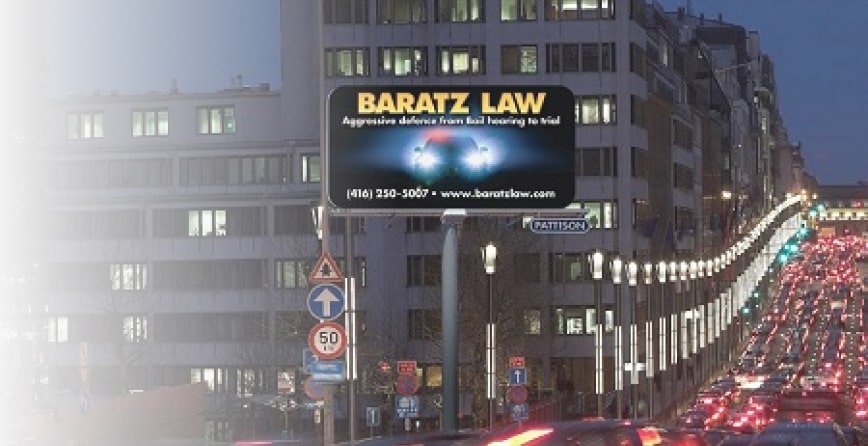
Legal Aid Lawyers in Brampton
Since I began practicing law 18 years ago I have been accepting Legal Aid Ontario (LAO) Certificates for many criminal and family cases. Legal Aid




If you find yourself charged with a criminal offence and in need of a criminal defence lawyer in the Toronto area then look no further than Baratz Law. With over 18 years of legal and courtroom experience, Avi Baratz a seasoned criminal defence attorney in the Toronto area has the knowledge and experience to handle your criminal matter, no matter how big or how small. He is guided by his integrity and driven by his passion for superior results. Rest assured that Mr. Baratz goes the extra mile when defending and representing his clients. Baratz Law has successfully represented and defended hundreds of clients in criminal court as well as parents going through difficult custody and access disputes, including high conflict divorces. He also represents parents who are up in court against the Children’s Aid Society (CAS). Mr. Baratz knows that you or a loved one are now facing a life changing event and that liberties and freedoms, that we all take for granted, are at stake.
When using Baratz Law you will have a reliable and experienced Toronto criminal defense lawyer who is dedicated and committed to providing top-notch representation for individuals facing criminal charges. With a proven track record of success, Avi understands the complexities of the Canadian legal system and will work tirelessly to protect your rights.
Whether you’re dealing with charges related to drug offenses, assault, theft, white-collar crimes, or any other criminal allegation, he is here to offer strategic and personalized legal solutions. Avi’s approach involves a thorough analysis of the evidence, meticulous case preparation, and skillful negotiation or aggressive litigation when necessary.
Contact Mr Baratz, a trusted Criminal Defence Lawyer in Toronto today to schedule a confidential consultation.

“I look forward to proving to you that you are in good hands, from the very beginning to the very end of your file. Your success is my success.”










The service that I received was really good. The advise that he provided me gave me the ability to make the proper decisions on my file. Avi was polite and took the time to explain every detail in my file. Great law office and highly recommend if anyone is looking for a lawyer.


Since I began practicing law 18 years ago I have been accepting Legal Aid Ontario (LAO) Certificates for many criminal and family cases. Legal Aid

If you find yourself charged with a criminal offence in Brampton I would highly recommend that you seek the advice and counsel of a criminal

In Canada the defence known as “self-defence” is available to those charged with a criminal charge such as assault, assault bodily harm and other forms

The term “DRE” refers to a Drug Recognition Expert. These are police officers who have undergone special training and who Parliament has deemed in the criminal code of Canada to be experts. When they testify in court, generally speaking their evidence is held to be expert opinion evidence. A drug recognition expert conducts physical examinations of accused persons detained or charged in regard to impaired driving by a drug at a police station. The Drug in question can be either illegal drugs such as cocaine, heroin, ecstasy etc., or legal prescribed substances and medications such as clonazepam, methadone, baclofen, etc. An accused person under these circumstances is subjected to numerous physical tests such as having their blood pressure taken, body temperature taken, walking in a straight line and other intrusive tests, similar if not far more intrusive than a physical at the doctor’s office. A demand for bodily substances can also be made, such as a urine sample. The DRE will examine the individual and make a determination whether s/he believes the accused is impaired by a certain classification of drugs. His/her conclusions will be based on the findings and the results of the DRE evaluation. Assuming a DRE comes to the conclusion that the accused is impaired, his/her findings will be brought into evidence in a criminal trial should they be challenged. However, ultimately it is up to a Judge to decide if a person was legally impaired by a drug. If you would like to schedule a free confidential consultation, contact Avi Baratz at 416-937-3777 or email at avi@baratzlaw.com.
Often, lawyers who routinely practice in the criminal courts take it for granted that clients understand what they mean when they use the word “disclosure”. I am often humbled and brought down to earth when speaking to my clients and I use the term disclosure, when they ask me, “Sorry, what’s that? That word disclosure, what does that mean?”. So I decided to write a little post about what disclosure is. In a nutshell the right to disclosure comes from the philosophy that every Accused person in a criminal matter should know the allegations against them and the case they have to meet (to explain and defend). Everyone has a right to full and complete disclosure. This is a Constitutionally enshrined right. Disclosure goes to the heart of a fair trial. If you don’t know the case you have to meet, how can you properly defend yourself? So disclosure is the details and meat and potatoes of the “case against you”. An example of some common items you can expect to find in disclosure include but are not limited to the following: police notes, witness statements, videotaped interviews of witnesses, surveillance footage, photos of victim injuries, scene of crime photos, breath sample results, toxicology reports, fingerprint reports, forensic reports, past driving records, past criminal records, bank statements and business records.
This list is by far not exhaustive. Sometimes, a special motion has to be brought called a “third party records application” in order to obtain disclosure that the Crown and Police are not releasing – or that may be out of their control to produce in some cases (for example, in a fraud case, an alleged victim’s income tax return from CRA that on its face may not seem relevant to the case). Third party records are complex and will be dealt with in another post. For your purposes, think of disclosure as all the blocks that may be used by the Crown to build its case up from the ground, like a tall building. As a defendant in a criminal matter you have the right to see, use and test the same disclosure that the Crown will be relying on in your case. You have a right to all of it. Failing which, your charge could be stayed and dismissed for lack of disclosure. Without seeing and reading the disclosure, defence lawyers usually cannot provide solid opinions (if any) on the strengths or weaknesses of the case. Hope this helps clarify “disclosure” for my clients and those just browsing the blog post. If you have further questions or to schedule a free confidential consultation, call my office at 416-937-3777, or email me at avi@baratzlaw.com.
I get this situation come up quite a lot in my day to day practice. There is a domestic incident whereby one spouse is charged with an assault against their spouse or partner. It could be as minor as a shoving match or as serious as a weapon being used in the assault. Someone called the police and the police came and arrested the spouse for the alleged assault. The arrested spouse (I say spouse but could be partner, boyfriend, girlfriend, etc.) would then be held for a bail hearing or released from the police station after processing. They would likely have certain conditions such as no contact with the complainant (the alleged victim of the assault). This can be a problem for many reasons that the complainant did not realize when he or she called the police initially. For example, if the couple has children together and the complainant relies on the arrested spouse to care for the children, this will be next to impossible as the arresting spouse cannot be around the complainant. The complainant also advises that they deeply love the accused and did not mean to have him/her charged. So on many instances I get calls from clients who want to know how they can take back assault charges that they made for these and numerous other reasons. The first principle however is for you to understand that complainants (spouses, boyfriends, or girlfriends) do not charge anyone when police are involved. (I am not referring to private informations being laid). In the case of the police laying charges against an individual, the individual is not the one who charges the complainant. It is the state of Canada (Regina versus X, or R. v. X) versus the individual accused. Therefore, it is impossible or makes no sense to even have such a discussion because the complainant never charged the accused in the first place – it was the Country of Canada that did and the Country of Canada is not a person. As a complainant you can have influence or try to persuade the crown and/or police why the charges should not have been laid to begin with, but this is not the same thing as taking back the charges. A complainant in such a case needs to be careful because it is possible that they gave a statement under oath – also known as a KGB statement. If so, then reversing or trying to take back a statement that was made under oath could very well lead to perjury charges or mischief charges which can be worse than the underlying charge for which the accused is facing. Perjury is a serious offence against the administration of justice. If you find yourself charged with a domestic assault or want advice about a complaint you made to the police which lead to criminal charges against your spouse, please call Baratz Law for a free confidential consultation at 416-937-3777 or email at avi@baratzlaw.com.
